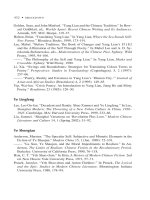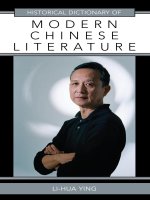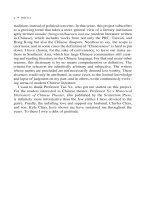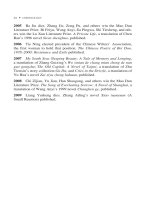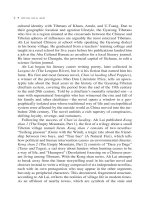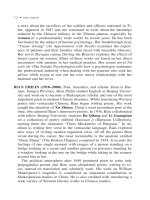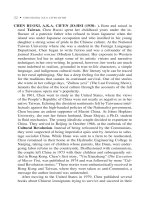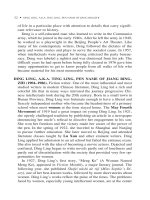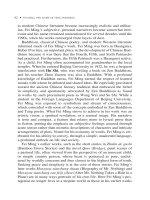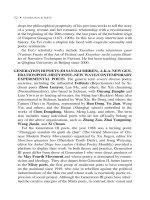"Historical Dictionary of Modern Chinese Literature" by Li-hua Ying - Part 15 pot
Bạn đang xem bản rút gọn của tài liệu. Xem và tải ngay bản đầy đủ của tài liệu tại đây (84.19 KB, 10 trang )
son of Vanessa Bell and nephew of Virginia Woolf, enabled her to form
enduring relationships with members of the Bloomsbury group. Encour-
aged by Virginia Woolf, with whom she corresponded, Ling wrote a
memoir in English, Ancient Melodies, about her childhood growing up
in an influential Beijing family headed by her scholar-official father,
with his six wives and 10 children. Partially because of this privileged
background and particially because of the narrow focus on women’s do-
mestic life in her writing, Ling is generally considered a “guixiu zuojia”
(writer of the boudoir). She was also an accomplished artist, thanks to
the training she received in her early childhood. She moved to London
in the late 1940s with her husband, Chen Xiying, a scholar and a diplo-
mat for the Nationalist government. She died in Beijing.
LITERARY RESEARCH SOCIETY (WENXUE YANJIU HUI). One
of the earliest literary organizations in 20th-century China, the Literary
Research Society was founded in 1921. Even at its inception, it was
unambiguous about its undertaking: to inject a dose of seriousness into
contemporary literature. This stance was in part a response to the so-
called Mandarin Ducks and Butterflies school (yuanyang hudie pai)
of literature, the main purpose of which was entertainment. Many of its
founding members, including Zheng Zhenduo, Mao Dun, Ye Sheng-
tao, and Zhou Zuoren, were prominent figures in the May Fourth
New Culture Movement. Through their efforts, the Literary Research
Society soon became the country’s most influential literary association,
attracting a large number of well-known writers and intellectuals such
as Wang Luyan, Xie Bingxin, Lao She, Liu Bannong, Xu Zhimo,
and others.
Mao Dun, a leading literary critic and a fiction writer, transformed
Xiaoshuo yuebao (Fiction Monthly) after he became its editor in 1921,
making it the main platform to promote the missions of the Literary
Research Society by publishing works of authors who believed in
“literature for life” (wenxue wei rensheng), a literature that offered
realistic portrayals of contemporary life and sober examinations of so-
cial problems in an attempt to advance changes in society. To steer the
development of modern Chinese literature in that direction, the Literary
Research Society used its publications and various book clubs to intro-
duce foreign literatures to its members and the general public, particu-
larly realist works from Russia, Europe, Japan, and India. Writers whose
works the Literary Research Society translated included Hans Christian
112 • LITERARY RESEARCH SOCIETY
Andersen, Lord Byron, Leo Tolstoy, Anton Chekhov, Maxim Gorky,
Ivan Turgenev, Roman Roland, Guy de Maupassant, Henrik Ibsen, Hen-
ryk Sienkiewicz, Rabindranath Tagore, George Bernard Shaw, Oscar
Wilde, and many others. When Fiction Monthly stopped publication in
1932, the Literary Research Society was also dissolved.
LIU BAIYU (1916–2005). Prose and fiction writer. A prominent writer in
the Mao era, Liu Baiyu held many important posts within the Chinese
Communist Party, including Party secretary of the Chinese Writers As-
sociation and deputy minister of culture. He joined the Chinese Com-
munist revolution soon after Japan invaded China and began his lifelong
work in the Communist army, with which he fought in the Sino-Japa-
nese War, the Civil War, and the Korean War.
A passionate believer in a utilitarian literature that serves the socialist
cause and ideological principles of the Communist Party, Liu devoted
his whole life to creating works that aimed to inspire and uplift the
national spirit. The lyrical essay “Richu” (Sunrise), a staple of school
textbooks in China, is representative of his work. It describes his experi-
ence on board an airplane from Moscow to Tashkent, a trip that allowed
him to witness sunrise from the sky. From the descriptions of sunrise
in nature, Liu moves on to talk about the “sunrise” in the hearts of the
Chinese people. The rising sun thus becomes a symbol of a new China,
a new society, a new life, and the youthful energy and idealism of the
Chinese people, echoing the speech made by Mao Zedong to Chinese
students studying in Moscow in which Mao compares the Chinese
youths to the morning sun, full of promise and hope. A romanticist at
heart, Liu sees the world in black and white contrasts in which good
always triumphs over evil.
Other than lyrical prose, Liu also wrote fiction and reportages. His
war novel Di’er ge taiyang (The Second Sun) is about the Communist
troops crossing the Yangtze and marching down south to take control
of Wuhan and Hunan from the hands of the Nationalist army and the
personal sacrifices made by several generals to secure the Communist
victory. The novel won the 1991 Mao Dun Literature Prize. An admirer
of Dante, Johann Wolfgang von Goethe, Ivan Turgenev, and Victor
Hugo, Liu favored hyperbole as well as expansive scenes and imageries
and is best remembered for his lyrical essays that extol the beauty of
the natural world, the value of life, the goodness of human nature, and a
harmonious society. See also SOCIALIST REALISM.
LIU BAIYU • 113
LIU BANNONG (1891–1934). Poet and linguist. The son of a teacher,
Liu Bannong was born in Jiangyin, Jiangsu Province. In 1912, he went
to Shanghai to work as an editor and began publishing poetry and es-
says in newspapers and magazines. In 1916, his work debuted in New
Youth, the most influential journal of the May Fourth New Culture
Movement. His essay “My Views on the Change of Written Chinese,”
published in the May 1917 issue, was a significant piece in promoting
modern Chinese language and literature. The same year, Liu took a
teaching post at Beijing University, where he began his experimenta-
tions with using colloquial expressions and folk songs in his poetry.
Under his urging, the Beijing University Monthly published folk ballads
collected from all over the country, including the 20 “Boat Songs” Liu
gathered from his native Jiangyin. In 1920, Liu went to London to study
and in the following year moved to Paris where he majored in linguistics
at the University of Paris. Upon receiving his Ph.D. in 1925, Liu went
back to China to continue his research on Chinese language and popular
literature. In 1934, while on a research trip to the northwest, Liu fell ill
and died a few months later in Beijing.
Liu is credited with elevating folk literature to the mainstream.
Through his research, his translations, and his own creative endeavors,
Liu introduced lowbrow forms to institutions of higher learning. His
campaign to bring down the ivory tower became part of the agenda of
the New Culture Movement and helped establish his prominent role in
modern Chinese intellectual development.
LIU HENG (1954– ). Novelist. Raised in a village on the outskirts of
Beijing, Liu Heng worked as a farmer and a factory worker and served
in the military. He is a realist writer, best known for his novellas. Most
of his early stories deal with rural communities and their basic needs for
daily survival. According to Liu, Chinese country life consists of four
essential ingredients: food, sex, physical strength, and dreams. “Gouri
de liangshi” (Dogshit Food) concerns starvation in the countryside. Fuxi
fuxi (Forbidden Love), which has been adapted into the erotic movie Ju
Dou by Zhang Yimo, examines the conflict between instinctual sexual
desire and social taboos in a traditional society. Canghe bairimeng
(Green River Daydreams) deals with the aspirations that provide spiri-
tual sustenance for the daily life of the peasants. As a novel that goes
beyond the description of village life, Canghe bairimeng is the author’s
ambitious attempt at reconstructing the cultural heritage of the Chinese
114 • LIU BANNONG
peasantry. Qiuju da guansi (Qiuju Goes to Court), which is the source
for another of Zhang Yimo’s movies, portrays a peasant woman fighting
stubbornly against the injustice done to her family by the village head.
Later Liu turned his attention to urban problems. His social novel Bai
wo (White Whirls) explores the emotional and psychological conflicts
of an ambitious research scientist who is trying to negotiate between a
marriage to a dutiful wife and an affair with another woman. By putting
the issue of sexuality under the microscope, Liu attempts to examine the
soul of the Chinese intellectual in modern-day society. Another novel,
Heide xue (Black Snow), probes the problems faced by a young juvenile
delinquent. Pinzui Zhang Damin de xingfu shenghuo (The Happy Life
of Loquacious Zhang Damin), a popular novel about a Beijing resident
of the lower social echelon, has received some critical attention. See
also ROOT-SEEKING LITERATURE.
LIU NA’OU (1900–1939). Fiction and screenplay writer. Born in Japan,
Liu Na’ou spent his first 16 years in Taiwan. He later studied Japa-
nese literature in Tokyo, where he was exposed to the writings of the
Japanese New Sensibility school. He went to Shanghai in 1926 and
studied French at Zhendan University. Liu was closely associated with
Mu Shiying and Shi Zhecun, modernist writers in the New Sensibil-
ity school who were active in Shanghai in the 1930s. He was the first
to introduce into China the French writer Paul Morand, who influenced
his work. Liu wrote about the city and its lures, and his only collection
of short stories, entitled Dushi fengjingxian (Skylines of the City), fore-
grounds the material aspects of modern life in the metropolis. Scenes
that are of particular importance to urban existence include ballrooms
and cafés, where Liu’s characters interact with one another and where
their personalities are shaped and defined. Like his friend Mu Shiying,
Liu was particularly interested in the character of the femme fatale, a
symbol of eros. Many of his stories revolve around a triangular rela-
tionship, with two men in pursuit of one woman, competing for her
attention with luxury goods. His characters are trendy men and women,
partaking of the vices of modern consumer culture represented by sex,
automobiles, and ballrooms. The Shanghai of Liu’s stories is a West-
ernized cosmopolis, not much different from the cities in Europe and
America in terms of modern amenities and materialist obsession. One
story, “Reqing zhigu” (The Essence of Love), features a Frenchman as
its protagonist in search of an oriental beauty.
LIU NA’OU • 115
As a publisher of journals and books, Liu was an ardent promoter
of modernist literature. He was also interested in film. He founded the
journal Xiandai dianying (The Modern Film) and wrote and directed a
few romantic movies. Liu was assassinated in 1940, allegedly by Shang-
hai gangsters.
LIU SUOLA (1955– ). Composer, singer, and fiction writer. Growing up
during the Cultural Revolution, Liu Suola wrote her first story in 1984,
a few years after graduating from the Central Conservatory of Music,
where she studied composition and piano. Trained in classical music,
she finds rock and roll and the blues more fitting to her rebellious spirit.
Pursuing her dual career of musician and writer, Liu has been success-
ful in both endeavors, though recently she has spent more energy on
her experimental music. Her literary output consists of fictional works,
most of which are novellas. “Ni biewu xuanze” (You Have No Choice)
is about life in a music school where students feel frustrated with the
authoritarian environment. It highlights the tensions in Chinese society
between high-handed repression and uncontrollable creative spirit and
gives voice to the sense of futility and discontent felt by the “lost gen-
eration” born in the 1960s and 1970s. A short novel, Hundun jia lige-
leng (Chaos and All That), based on her sojourn in London, reflects the
eclectic influences in the author’s life, from street profanities to political
mumbo jumbo, from Chinese operas to Western rock lyrics. Narrated
by an émigré artist who lives in London, the story records events that
took place in Beijing in the memories of the protagonist. Another novel,
Nüzhen tang (Soup of the Female Chastity), is a collage of an assort-
ment of genres, including myths, travel notes, drama, poetry, folk songs,
newspaper articles, and screenplays. The novel tells a futuristic story
that takes place four thousand years from now.
Liu’s other publications include “Lantian lühai” (Blue Sky and Green
Sea) and “Xunzhao ge wang” (In Search of the King of Singers). In all
her works, the influences of Jack Kerouac, J. D. Salinger, Albert Camus,
and Joseph Heller, whose works she read in the early 1980s, are easily
detected. Her heroes are artist rebels who share many similarities with
the author herself.
Liu currently lives in New York. She continues to write and perform
music and has released three albums. See also WOMEN.
LIU XINWU (1942– ). Fiction writer and essayist. In the immediate post-
Mao era, Liu Xinwu was one of the most prominent literary names,
116 • LIU SUOLA
identified as the representative writer of scar literature for his numer-
ous stories exposing the damage left by the Cultural Revolution. His
first story, “Ban zhuren” (Class Counsellor) was published in 1977,
a year before Lu Xinhua’s “Shangheng” (The Scar), which gives the
movement its name. “Ban zhuren” explores the harmful influence of
the Cultural Revolution on the minds of the Chinese youth. Through
the portrayal of two teenagers and their reactions to a love scene in the
novel Gadfly by Ethel Lilian Voynich, the story denounces the crime of
ultraleftist policies and beseeches the society to save its children. This
call echoes the cry Lu Xun voiced 60 years earlier in “Kuangren riji”
(The Diary of a Madman) to save the children from Confucian ethical
codes. This connection lends “Ban zhuren” an unmistakable sense of
history and serves as a warning to the public that the old demons have
come back in disguise to threaten the spiritual health of the children.
“Aiqing de weizhi” (The Status of Love), “Xinglai ba, didi” (Awake,
My Brother), and “Ai mei yipian shuye” (I Love Every Green Leaf) are
among Liu’s “scar” stories.
Liu later turned to write a series of stories about Beijing life. The ide-
alized characters in his scar works are replaced with characters that are
more realistic. Absent also is the motivation to expose social problems.
The best known among this group of writings is Zhonggu lou (The Bell
and Drum Towers), which recounts the past and present of several fami-
lies in a neighborhood located in an old section of Beijing. Liu adopts a
unique angle of observation that allows him to devote minute attention
to each one of the 30 or so characters. The lack of a central character
gives the text a polyphonic feel, allowing the reader a panoramic view
of a society in action.
As a writer, Liu is particularly good at taking the pulse of society. He
is aware of what the pressing issues of the day are and knows how to ad-
dress them effectively. For this talent, he is considered a writer of social
literature and tends to appeal to a large number of readers. As editor-in-
chief of People’s Literature, he has also exerted a strong influence in
the development of Chinese literature.
LIU YICHANG, PEN NAME OF LIU TONGYI (1918– ). Fiction
writer, essayist, and newspaperman. Born in Shanghai, Liu Yichang was
born in Shanghai and graduated from St. Johns University in 1981. All
his life he worked as a journalist and editor. He moved to Hong Kong in
1948 and wrote for the Xingdao Evening and a few years later he went to
LIU YICHANG, PEN NAME OF LIU TONGYI • 117
Singapore to edit a newspaper there. Returning to Hong Kong in 1957,
Liu continued his writing career. Other than the large quantity of articles
he wrote for newspapers, Liu devoted much of his time to his creative
work. His novel Jiutu (An Alcoholic) is considered the first Chinese
novel to use the technique of stream of consciousness. The protagonist
is a writer, not unlike the author himself, forced by circumstances to
give up his literary dreams to write popular, tasteless novels. As his
notoriety rises, he sinks low spiritually. The random, disjointed remarks
made in his drunken state are the most revealing of his psyche. When
he sobers up, he has to face reality. Between drunkenness and sobriety,
between illusion and reality, lies the inconvenient truth that ideals are
hard to realize in real life.
Liu’s other notable works include another novel, Taoci (Chinaware),
four collections of novellas and short stories: Tiantang yu diyu (Heaven
and Hell), Si nei (Inside the Temple), Yi jiu jiu qi (Nineteen Ninety-
seven), and Chun yu (Spring Rain). Liu’s fictional works are noted for
their penchant for avant-gardism and experimentalism, representing the
modernist movement in Hong Kong. Liu has had a long, prolific career
in literature and journalism. He is also noted for his success at building
bridges between Chinese-speaking communities by publishing literature
written in Chinese from all over the world during his tenure as the edi-
tor-in-chief and director of Hong Kong Literature from 1985 to 2002.
LIU ZHENYUN (1958– ). Fiction writer. Born in Yanjin, Henan Prov-
ince, Liu Zhenyun was a schoolteacher and an army soldier before at-
tending Beijing University. Upon graduation, he was assigned to work
for the Peasant Daily. From 1989 to 1991, Liu was a graduate student at
the Lu Xun Institute of Literature. He currently lives in Beijing.
Liu began publishing in 1982, the year he graduated from college, but
fame did not find him until the late 1980s, when his short story “Yidi
jimao” (Ground Covered with Chicken Feathers) was published. The
story, told in a naturalistic manner, presents the tedious and hopeless
life of an office worker in the city. A later novel, Shouji (Cell Phone),
a satirical treatment of corruption that penetrates every aspect of social
life, brought him to the height of his fame when it was adapted into a
movie.
Similar thematic concerns dominate many of his works written in
the 1990s, most notably the series of stories centered on his hometown.
These poignant stories examine the makeup of the nation’s culture by
118 • LIU ZHENYUN
analyzing the pervasive abuse of power in society. In Guxiang tianxia
huanghua (Hometown Filled with Yellow Flowers), the pursuit of the
coveted job of village head has caused hatred and cost lives for genera-
tions between two families. Since the position brings power and power
brings unlimited access, both families are willing to sacrifice their lives
for it. Guxiang xiangchu liuchuan zhong (Hometown Interacting with
Legends) connects the present with the past by bringing historical fig-
ures, such as Cao Cao (155–220) of the Three Kingdoms and Empress
Dowager Cixi (1838–1908) of the Qing, side by side with the village’s
party secretary. However, the author reserves his sharpest criticism for
the masses for their complacency. Guxiang mian he huaduo (Hometown
Noodles and Flowers) examines, in the author’s typical mocking voice,
history and its webs of connections in which whoever has the power of
speech has control of everything else. Yiqiang feihua (All Bullshit) ex-
pands Liu’s interest in cultural inquiries into a philosophical reflection
on language. The novel is an allegorical tale about a group of imagina-
tive people in the lower echelons of society who love to picture them-
selves in a different kind of life but are frightened by their own thoughts.
In order to cure the fear, they try to return to normalcy by talking about
their real life only to find the words to be nothing but pure nonsense.
Suspecting that they have gone crazy, they leave home to look for the
cause of their insanity.
Liu is one of the most creative voices in modern Chinese literature.
He is noted for his superb ability to retain satirical intervention without
shortchanging a realistic representation of life. The comic element often
found in his works serves to enhance the sense of absurdity in everyday
life. Wo jia Liu Yuejin (My Name Is Liu Yuejin) turns upside down the
logic of “the survival of the fittest” by giving the “sheep” a chance to
defeat the “wolves.” Liu Yuejin is a cook on a construction site. While
looking for his lost bag, he chances upon another bag that contains a
computer disk whose content, once revealed, would potentially destroy
the lives of several important people. A hide-and-seek game ensues,
ending in the triumph of the kind and harmless protagonist.
LU LING (1923–1994). Novelist and playwright. For the appearances
of his writings in Qi yue (July), a literary journal edited by Hu Feng in
the 1930s and 1940s, Lu Ling was forever associated with the so-called
July school and suffered because of it. His best work is the novel Cai-
zhu de ernümen (Sons and Daughters of a Landlord), about a prominent
LU LING • 119
family being ruined when the children vie with one another for the fam-
ily inheritance. Through the vicissitudes in the fortunes of the sons and
daughters of a powerful landlord, the novel reveals the intricate histori-
cal path modern Chinese intellectuals have followed. The descriptions
of violent internal conflicts and the tortured psychological states of the
characters are strikingly original for early modern Chinese literature.
Other important fictional works by Lu include Ji’e de Guo Su’e (The
Hungry Guo Su’e), a novella praised by critics for its expression of
basic humanity, and Woniu zai jingji shang (A Snail in Thorns), a psy-
chological study of a pathetic character who hovers between spiritual
paralysis and utter savagery, as well as “Luo Dadou de yisheng” (The
Life of Luo Dadou), about the degenerated son of an old family, and
“Yuyan” (Prediction), which deals with the tragic fate of a woman who
works far away from her family. Lu’s best-known play is a four-act
tragedy written in 1947 entitled Yunque (Skylark), which established
him as a leading dramatist.
In 1954, Lu Ling was jailed as one of the core members of the “Hu
Feng Anti-Party Clique,” tragically ending a brilliant career. He spent
the next 20 years in prison, until Hu Feng’s rehabilitation in the late
1970s allowed Lu Ling to be released. From the early 1980s, Lu Ling
tried his hand at poetry and prose, but old age and poor health owing to
many years of nightmarish life in prison made it impossible for him to
recapture the vitality of his past. His earlier works, banned for decades,
have now been made available. See also SPOKEN DRAMA.
LÜ LUN, PEN NAME OF LI LINFENG (1911– ). Born into a sailor’s
family in Hong Kong, Lü Lun participated in the Northern Expedi-
tion. After he returned to Hong Kong, he began to publish essays
and short stories in local newspapers. When the film industry moved
to Hong Kong as Japan invaded Shanghai, Lü Lun began to write
screenplays, producing films with such household names as Chun
can hua wei luo (Flowers Still in Bloom when Spring Ends), Xian
duan qü zhong (Broken Strings End the Song), Pengmen shunü (Lady
from a Humble Abode), and Dadi de ernü (Sons and Daughters of the
Land). When Japan occupied Hong Kong, Lü Lun fled to Guangdong
and spent three years teaching at an elementary school. When Japan
surrendered, he returned to Hong Kong and continued to work in the
newspaper industry.
120 • LÜ LUN, PEN NAME OF LI LINFENG
As a native Hong Kong writer, Lü lun devoted his talents to depicting
his city and its residents. An eyewitness to Hong Kong’s changes in the
20th century, Lü provides valuable insights into the soul of the city.
LU QIAO, PEN NAME OF WU NASUN (1919–2002). Fiction and
prose writer. Born in Beijing and educated at the Southwest United
University in Kunming, Lu Qiao left China in 1945 for the United States
and graduated with a Ph.D. in art history from Yale University in 1954.
Lu Qiao spent most of his professional life teaching art history at Ameri-
can universities. His scholarly publications are written in English, while
his fiction and prose work is exclusively in Chinese, mostly written in
the mid-20th century. Lu’s best-known work is a novel, Wei yang ge
(The Unfinished Song), completed in the mid-1940s during the Sino-
Japanese War (1937–1945) and published in 1957 in Hong Kong. The
book is based on his own student days in Kunming, when the Japanese
invasion forced the professors and students of China’s three elitist uni-
versities—Beijing University and Qinghua University in Beijing and
Nankai University in Tianjin—to take refuge in the remote southwest-
ern city. It centers on the students and the professors and local residents
with whom they interact on a daily basis. Although the idealized student
life is not altogether divorced from the war raging outside the bucolic
campus, the author takes pains to deemphasize the national crisis, focus-
ing instead on friendships and the pursuit of spiritual fulfillment. The
novel evolves around four characters, all with attractive personalities
and each in his or her own way working toward the goal of self-im-
provement and moral and ethical perfection. Lyrical and romantic in
style, the novel is a eulogy for youth: a song of innocence. Lu Qiao’s
other stories and essays are collected in Ren zi (Son), Chan qing shu
(Letters of Regrets), and Shi chen ju (Living in the Mundane World).
LU WENFU (1927–2005). Fiction writer. Born in Suzhou, a city he loved
and devoted his whole career to depicting, Lu Wenfu worked for many
years as a journalist and magazine editor and served as president of the
Jiangsu Writers’ Association and vice president of the Chinese Writers’
Association. His literary career began in the 1950s with short stories
about life in the small alleys of Suzhou, the most famous of which is
“Xiao xiang shen chu” (Deep within a Lane). He is best known as the
author of “Meishi jia” (The Gourmet), a novella about Suzhou cuisine
and food culture. By all accounts, Lu was an old-fashioned gentleman
LU WENFU • 121
